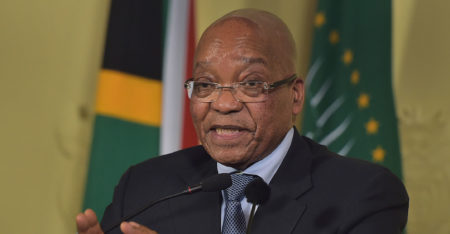
South African President Jacob Zuma is facing renewed calls for his removal as senior leaders of the ANC, including two cabinet ministers, blamed him and his closest supporters for the party’s worst electoral showing since apartheid ended.
While Zuma still has strong support within the ruling party, the ministers and five other members of the ANC’s national executive committee are concerned that the plunge in support in Wednesday’s municipal vote threatens an even worse showing in 2019 national elections.
They asked not to be identified because the party hasn’t made an official comment.
One of the people said senior ANC officials have suggested calling a conference to elect new leadership before the one scheduled for December next year.
The ANC won 62% in 2011 municipal elections, compared with about 54,4% of the vote this year with 96% of the ballots counted, and had majorities in seven of the country’s eight metropolitan areas.
While the final results of this election haven’t been announced, the party conceded defeat in Nelson Mandela Bay and looks set to win less than 50% in both Pretoria, the capital, and Johannesburg, the biggest city.
“It’s terrible news for Jacob Zuma,” Mcebisi Ndletyana, a politics professor at the University of Johannesburg, said in an interview. “This is a serious show of disapproval of his leadership. Every right-minded person has been saying Jacob Zuma is a serious liability to the ANC.”
Erratic decisions
The people blamed Zuma, 74, and his closest supporters for costing the ANC support because of a series of scandals and erratic decisions.
In December, he fired a respected finance minister, sending the rand to a record low, only to change his mind four days later after complaints from business and party leaders.
This year, the nation’s highest court said he breached the constitution by refusing to pay back taxpayer money spent on his private home while another court said the decision by state prosecutors to drop corruption charges against him weeks before he became president in 2009 was irrational.
“Zuma now gives the impression of being in office but not in power,” Nicholas Spiro, a partner at London-based Lauressa Advisory, which advises asset managers, said by e-mail. “The election result is a huge vote of no confidence in his presidency and will deepen divisions within the ANC.”
The ANC lost the vote in the town of Nkandla, where Zuma has his private residence, to the Inkatha Freedom Party, which has governed the area since a 2012 by-election.
Yet, Zuma’s allies in the national executive committee and in the government may shield him from being replaced before his current presidential term ends in 2019.
“The results may weaken President Zuma’s position inside the ANC,” Fitch Ratings said in a statement. “However, Mr Zuma has built a strong network of support in the ANC’s upper echelons, and there have been no clear signs that a majority of leaders could withdraw their support.”
Support
Both the ANC’s women’s and youth leagues pledged support for Zuma.
“You can’t blame just one leader,” ANC Women’s League president Bathabile Dlamini said in an interview at the results center in Pretoria.
“We will absolutely back him until the next conference. What we know is that he has to finish his term and thereafter we will see how things go in the next conference.”
Besides unhappiness with Zuma, the ANC has also come under criticism for failing to reduce a 27% unemployment rate, improve living standards and reignite an economy that the central bank projects will post zero growth this year.
Communities staged 102 protests against a lack of decent housing, education and other services in the first seven months of the year, up from 89 in the same period last year, according to Municipal IQ, which monitors the municipalities.
Pressure builds
The rand weakened by 0,7% to R13,80/US$ at 4.38pm in Johannesburg on Friday along with other emerging market currencies.
It was the best performer of 24 emerging market currencies monitored by Bloomberg on Thursday. The currency is still down about 40% against the dollar since Zuma took office on 9 May 2009.
Following the municipal vote, pressure will intensify on Zuma in the lead-up to party elections late next year, according to Robert Besseling, the executive director of risk advisers EXX Africa.
“The election is a referendum on President Zuma to a certain extent,” Besseling said by phone from Johannesburg. “I think he will be blamed for the party’s showing. Various NEC members will start fearing for their jobs. That will make them start shifting their loyalty to the anti-Zuma faction within the party.” — (c) 2016 Bloomberg LP




